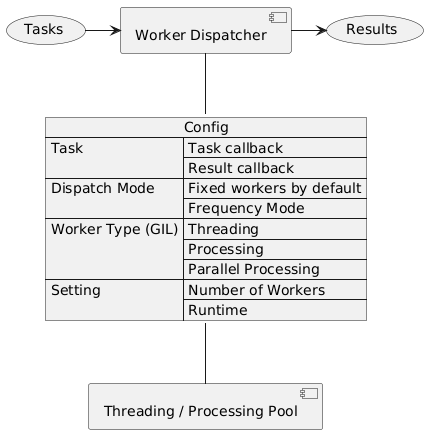A flexible task dispatcher for Python with multiple threading or processing control
Project description
Python Worker Dispatcher
A flexible task dispatcher for Python with multiple threading or processing control
Features
-
Tasks Dispatching to managed worker
-
Elegant Interface for setup and use
OUTLINE
DEMONSTRATION
Use 20 theads concurrently to dispatch tasks for HTTP reqeusts
import worker_dispatcher
import requests
def each_task(id: int, config, task):
response = requests.get(config['my_endpoint'] + task)
return response
responses = worker_dispatcher.start({
'task': {
'list': ['ORD_AH001', 'ORD_KL502', '...' , 'ORD_GR393'],
'callback': each_task,
'config': {
'my_endpoint': 'https://your.name/order-handler/'
},
},
'worker': {
'number': 20,
}
})
Utilizes all CPU cores on the machine to compute tasks.
import worker_dispatcher
def each_task(id: int, config=None, task=None):
result = sum(id * i for i in range(10**9))
return result
if __name__ == '__main__':
results = worker_dispatcher.start({
'task': {
'list': 10,
'callback': each_task,
},
'worker': {
'multiprocessing': True
}
})
INTRODUCTION
This library helps to efficiently consume tasks by using multiple threading or processing and returns all results jointly.
INSTALLATION
To install the current release:
$ pip install worker-dispatcher
USAGE
By calling the start() methid with the configuration parameter, the package will begin dispatching tasks while managing threading or processing based on the provided settings. Once the tasks are completed, the package will return all the results.
An example configuration setting with all options is as follows:
import worker_dispatcher
results = worker_dispatcher.start({
'debug': False,
'task': {
'list': [], # Support list and integer. Integer represent the number of tasks to be generated.
'callback': your_function_name_for_each_task,
'config': {'your_config': 'your_value'},
'result_callback': your_function_name_for_each_result,
},
'worker': {
'number': 8,
'per_second': 0, # If greater than 0, the specified number of workers run forcefully at set intervals.
'cumulative': False, # Cumulative mode for per_second method.
'multiprocessing': False
}
})
Options
| Option | Type | Deafult | Description |
|---|---|---|---|
| debug | bool | False | Debug mode |
| task.list | multitype | list | The tasks for dispatching to each worker. * - List: Each value will be passed as a parameter to your callback function. - Integer: The number of tasks to be generated. |
| task.callback | callable | (sample) | The callback function called by each worker runs |
| task.config | multitype | list | The custom variable to be passed to the callback function |
| task.result_callback | callable | Null | The callback function called when each task processes the result |
| worker.number | int | (auto) | The number of workers to fork. (The default value is the number of local CPU cores) |
| worker.per_second | float | 0 | If greater than 0, the specified number of workers run forcefully at set intervals. |
| worker.cumulative | bool | False | Cumulative mode for per_second method. |
| worker.multiprocessing | boolean | False | Use multi-processing instead of the default multi-threading |
task.callback
The callback function called by each worker runs
callback_function (id: int=None, config=None, task=None)
| Argument | Type | Deafult | Description |
|---|---|---|---|
| id | int | (auto) | The sequence number generated by each task starting from 1 |
| config | multitype | {} | The custom variable to be passed to the callback function |
| task | multitype | (custom) | Each value from the task.list |
task.result_callback
The callback function called when each task processes the result
result_callback_function (id: int=None, config=None, result=None, log: dict=None)
| Argument | Type | Deafult | Description |
|---|---|---|---|
| id | int | (auto) | The sequence number generated by each task starting from 1 |
| config | multitype | {} | The custom variable to be passed to the callback function |
| result | multitype | (custom) | Each value returned back from task.callback |
| log | dict | (auto) | Reference: get_logs() |
Other Methods
-
get_results()
Get all results in list type after completing
start() -
get_logs()
Get all logs in list type after completing
start()Each log is of type dict, containing the results of every task processed by the worker:
- task_id
- started_at
- ended_at
- duration
- result
-
get_result_info()
Get a dict with the whole spending time and started/ended timestamps after completing
start() -
get_tps()
Get TPS report in dict type after completing
start()or by passing a list data.def get_tps(logs: dict=None, debug: bool=False, peak_duration: float=0) -> dict:
The log dict matches that of the get_logs(), each
resultof a log will be considered valid if it meets one of the following conditions:- It is a
requests.Responseobject with a status code of 200 - It is a valid value other than the aforementioned object
- It is a
Scenarios
Stress Test
Perform a stress test scenario with 10 requests per second.
import worker_dispatcher, requests
def each_task(id, config, task):
response = None
try:
response = requests.get(config['my_endpoint'], timeout=(5, 10))
except requests.exceptions.RequestException as e:
print("An error occurred:", e)
return response
responses = worker_dispatcher.start({
'task': {
'list': 5000,
'callback': each_task,
'config': {
'my_endpoint': 'https://your.name/api'
},
},
'worker': {
'number': 10,
'per_second': 1
}
})
print(worker_dispatcher.get_logs())
print(worker_dispatcher.get_tps())
Project details
Download files
Download the file for your platform. If you're not sure which to choose, learn more about installing packages.
Source Distribution
Built Distribution
Hashes for worker_dispatcher-1.0.0-py3-none-any.whl
| Algorithm | Hash digest | |
|---|---|---|
| SHA256 | e335e16927823efe5027c9921c26e8b3c245b210fbb905d098e2139e5accb773 |
|
| MD5 | c0095175128b50a4c334a9a20f43beea |
|
| BLAKE2b-256 | 29ee47535c7f4c983333caf3464c0895d0192ac1d5bd113c8e2a79a5f00f9c9c |















